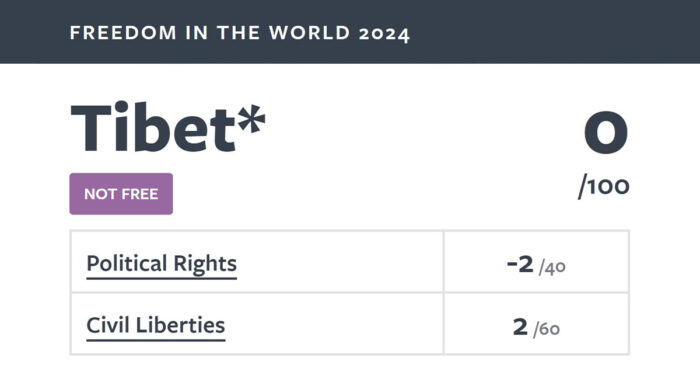
After 65 years of Chinese occupation, Tibet’s global freedom score has now dropped all the way to zero, watchdog group Freedom House says in its new Freedom in the World report.
“This score leaves no doubt that China’s occupation of Tibet has been a global catastrophe,” International Campaign for Tibet President Tencho Gyatso said. “For 65 years, the Chinese government has brutalized Tibet to the point that its global freedom score has now hit rock bottom. That is a clear indictment of China’s failed policies in Tibet and the need for the Chinese government to get back to peaceful dialogue with Tibetan leaders to resolve this disastrous occupation.”
In Freedom House’s 2024 report—released today, Feb. 29—Tibet has a political rights score of negative 2 out of a possible 40 and a civil liberties score of 2 out of a possible 60. That gives Tibet an overall score of 0 out of 100.
The zero rating is Tibet’s worst in at least eight years. Tibet had an overall score of 1 in Freedom House’s 2023 report.
65th anniversary of Tibetan National Uprising
Tibet’s new low score arrives as Tibetans prepare to mark the 65th anniversary of the March 10, 1959 Tibetan National Uprising and the subsequent flight of the Dalai Lama into exile on March 17, 1959.
Under China’s rule, Tibetans lack the freedom to practice their Buddhist faith, speak their own language and even raise their own children.
One of the most horrific reports to emerge from Tibet in 2023—the year Freedom House analyzed for its report—was of China’s state-run boarding schools in Tibet, which have separated over 1 million Tibetan children from their families and forced them to learn in Chinese with a curriculum focused on Chinese subjects.
The boarding schools are part of China’s policy of “Sinification,” which seeks to eliminate Tibetans’ unique culture, language and identity by forcing them to assimilate as loyal subjects of the Chinese Communist Party.
China has also reportedly collected DNA from about 1 million residents of the Tibet Autonomous Region, which spans much of central and western Tibet. According to Human Rights Watch, the Chinese government has even taken blood from children as young as 5 without their parents’ consent.
China has also clamped down on Tibet’s borders, making it nearly impossible for foreign journalists, diplomats and tourists to enter the country—and for Tibetans to escape as refugees.
Resolving Tibet
Despite China’s 65 years of brutality, Tibetans continue to show resistance and resilience.
Just this month, thousands of Tibetans in Derge (Chinese: Dege) County in eastern Tibet took part in mass protests against a proposed hydropower dam that will force two villages to vacate and destroy several Buddhist monasteries, including several centuries-old religious murals. Chinese authorities have reportedly arrested over 1,000 of the protestors.
Tibet has also received growing support from the international community.
At the UN Human Rights Council’s Universal Periodic Review of China in January, the number of states that raised concerns about Tibet more than doubled compared to China’s last review in 2018.
Earlier this month, the US House passed the Promoting a Resolution to the Tibet-China Dispute Act. Known as the Resolve Tibet Act, the bipartisan bill will strengthen US efforts to push the Chinese government to get back to the negotiating table with Tibetan leaders to finally resolve China’s 65-year occupation of Tibet.

